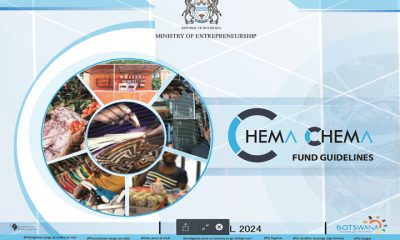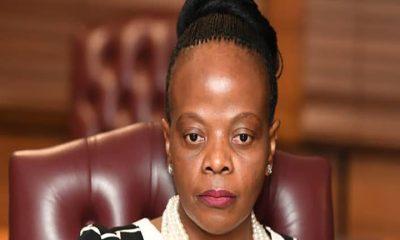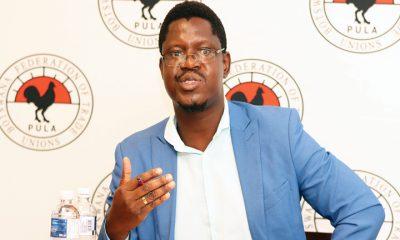Explained: Why Botswana is no.1 on worldwide rape list

Fresh information seen by this publication explains for the first time why Botswana is the country with the highest rape rate in the world, with 96.87 cases of rape being reported per 100,000 people[ihc-hide-content ihc_mb_type=”show” ihc_mb_who=”1,2,3″ ihc_mb_template=”1″ ]
This publication reported in 2021 that Botswana was ranked top of all countries on the rape statistics in the world at 92.93 per 100,000 people by World Population Review.
In a new report by American based organisation Wisevoter, the cases of rape being reported increased from 92.93 per 100,000 people in 2021 to 96.87 per 100,000 per person in 2023.
“The rate of sexual assaults in Botswana is so high that it is more than double the global average of 35 cases reported per 100,000 people,†the new report says.
According to the report, this alarming figure has been attributed to a plethora of factors such as the prevalence of alcohol abuse, gender-based violence, and a lack of adequate sexual education within the country.
“The government has taken strides to address this issue by implementing laws against gender-based violence, reforming outdated attitudes towards sexual assault and introducing comprehensive sex education in schools,†the report says.
It added that; “However, reports suggest that there remains much work to be done in order to reduce the still alarmingly high rates of rape in Botswana and bring it closer to international standards.â€
The report says the 10 countries with the highest recorded rape statistics in the world are Botswana, Lesotho, Grenada, Sweden, Eswatini, South Africa, Saint Kitts and Nevis, Panama, Iceland and Suriname.
The reported reiterated that Botswana has the highest rate of rapes per 100,000 people, with 96.87 cases being reported. This is followed closely by Lesotho with 89.29 incidents of rape, and Grenada with 88.87 cases of rape recorded per 100,000 people respectively.
Sweden sits in fourth place at 87.97 cases of rape reported, and Eswatini rounds up the top five countries with the most rapes, with 82.73 rapes reported per 100,000 people.
South Africa is the sixth country with highest rape rate, with 70.22 instances of rape being recorded every year, while St Kitts & Nevis records 56.4 rapes per 100K people annually, putting it in in seventh position.
As number eight on this list lies Panama with 53.98 rapes per 100K inhabitants, while Iceland ranks ninth, with its 46.3 cases of rape reported annually. Finally, the tenth country with the highest rape statistics is Suriname, at a rate of 43.3 rapes per 100,000 people.
“In general, the higher the rape statistics of a country, the higher the probability that the system in place to record rape incidents is efficient, the lower the rape rate, the higher the chance that rape incidents are not being reported,†the report says.
The ten countries with the lowest rates of reported rape per 100,000 people are Oman, Bermuda, Saudi Arabia, Egypt, Azerbaijan, Syria, Mozambique, Palestine, Tajikistan and Nigeria. Countries like Oman and Bermuda have no reported rapes per 100,000 people in their population. Other countries such as Saudi Arabia and Egypt have similarly low statistics at 0.09 and 0.12 respective reported cases of rape per 100,000 inhabitants. Azerbaijan has a slightly higher rate at 0.15 reported rapes per 100,000 people while Syria reports slightly more at 0.17 rapes per 100K. Both Mozambique and Palestine had 0.19 and 0.25 rapes per 100K respectively, whereas Tajikistan at a rate of 0.36, and Nigeria, at 0.47, round out the list of the top ten countries with the lowest rape statistics in the world today. It is important to keep in mind that these statistics are made based on the number of reported cases of rape incidents, meaning that the fact that these countries have such low rates does not mean that rape incidents rarely happen in those countries, but rather that such incidents are not being reported.
The two countries with the lowest rape rates are Oman and Bermuda. While the absence of reported rape incidents in Bermuda and Oman could at first glance seem as an impressive feat, the reasons behind it may actually be concerning.
The report says rape is an incredibly underreported crime, meaning that many victims do not come forward to report due to fear of stigma or retribution.
“In these two countries, cultural norms strongly discourage survivors from speaking out about their experiences. Furthermore, there are often limited resources for victims- such as access to mental health care and legal support,†says the report. The report further indicates that additionally, gender inequality can play a role in victims’ reluctance to come forward; women’s rights may be seen as less valuable or important than men’s rights which could prevent victims from seeking help and justice.
“Finally, traditional views on marriage and sex can make it difficult for some rape survivors to report due to feelings of shame or being viewed negatively by their communities,†the report says.[/ihc-hide-content]
News
Nigerians, Zimbabweans apply for Chema Chema Fund

Fronting activities, where locals are used as a front for foreign-owned businesses, have been a long-standing issue in Botswana. These activities not only undermine the government’s efforts to promote local businesses but also deprive Batswana of opportunities for economic empowerment, officials say. The Ministry of Trade and Industry has warned of heavy penalties for those involved in fronting activities especially in relation to the latest popular government initiative dubbed Chema Chema.
According to the Ministry, the Industrial Development Act of 2019 clearly outlines the consequences of engaging in fronting activities. The fines of up to P50,000 for first-time offenders and P20,000 plus a two-year jail term for repeat offenders send a strong message that the government is serious about cracking down on this illegal practice. These penalties are meant to deter individuals from participating in fronting activities and to protect the integrity of local industries.
“It is disheartening to hear reports of collaboration between foreigners and locals to exploit government initiatives such as the Chema Chema Fund. This fund, administered by CEDA and LEA, is meant to support informal traders and low-income earners in Botswana. However, when fronting activities come into play, the intended beneficiaries are sidelined, and the funds are misused for personal gain.” It has been discovered that foreign nationals predominantly of Zimbabwean and Nigerian origin use unsuspecting Batswana to attempt to access the Chema Chema Fund. It is understood that they approach these Batswana under the guise of drafting business plans for them or simply coming up with ‘bankable business ideas that qualify for Chema Chema.’
Observers say the Chema Chema Fund has the potential to uplift the lives of many Batswana who are struggling to make ends meet. They argue that it is crucial that these funds are used for their intended purpose and not siphoned off through illegal activities such as fronting. The Ministry says the warning it issued serves as a reminder to all stakeholders involved in the administration of these funds to ensure transparency and accountability in their disbursement.
One local commentator said it is important to highlight the impact of fronting activities on the local economy and the livelihoods of Batswana. He said by using locals as a front for foreign-owned businesses, opportunities for local entrepreneurs are stifled, and the economic empowerment of Batswana is hindered. The Ministry’s warning of heavy penalties is a call to action for all stakeholders to work together to eliminate fronting activities and promote a level playing field for local businesses.
Meanwhile, the Ministry of Trade and Industry’s warning of heavy penalties for fronting activities is a necessary step to protect the integrity of local industries and promote economic empowerment for Batswana. “It is imperative that all stakeholders comply with regulations and work towards a transparent and accountable business environment. By upholding the law and cracking down on illegal activities, we can ensure a fair and prosperous future for all Batswana.”
News
Merck Foundation and African First Ladies mark World Health Day 2024

Merck Foundation, the philanthropic arm of Merck KGaA Germany marks “World Health Day” 2024 together with Africa’s First Ladies who are also Ambassadors of MerckFoundation “More Than a Mother” Campaign through their Scholarship and Capacity Building Program. Senator, Dr. Rasha Kelej, CEO of Merck Foundation emphasized, “At Merck Foundation, we mark World Health Day every single day of the year over the past 12 years, by building healthcare capacity and transforming patient care across Africa, Asia and beyond.
I am proud to share that Merck Foundation has provided over 1740 scholarships to aspiring young doctors from 52 countries, in 44 critical and underserved medical specialties such as Oncology, Diabetes, Preventative Cardiovascular Medicine, Endocrinology, Sexual and Reproductive Medicine, Acute Medicine, Respiratory Medicine, Embryology & Fertility specialty, Gastroenterology, Dermatology, Psychiatry, Emergency and Resuscitation Medicine, Critical Care, Pediatric Emergency Medicine, Neonatal Medicine, Advanced Surgical Practice, Pain Management, General Surgery, Clinical Microbiology and infectious diseases, Internal Medicine, Trauma & Orthopedics, Neurosurgery, Neurology, Cardiology, Stroke Medicine, Care of the Older Person, Family Medicine, Pediatrics and Child Health, Obesity & Weight Management, Women’s Health, Biotechnology in ART and many more”.
As per the available data, Africa has only 34.6% of the required doctors, nurses, and midwives. It is projected that by 2030, Africa would need additional 6.1 million doctors, nurses, and midwives*. “For Example, before the start of the Merck Foundation programs in 2012; there was not a single Oncologist, Fertility or Reproductive care specialists, Diabetologist, Respiratory or ICU specialist in many countries such as The Gambia, Liberia, Sierra Leone, Central African Republic, Guinea, Burundi, Niger, Chad, Ethiopia, Namibia among others. We are certainly creating historic legacy in Africa, and also beyond. Together with our partners like Africa’s First Ladies, Ministries of Health, Gender, Education and Communication, we are impacting the lives of people in the most disadvantaged communities in Africa and beyond.”, added Senator Dr. Kelej. Merck Foundation works closely with their Ambassadors, the African First Ladies and local partners such as; Ministries of Health, Education, Information & Communication, Gender, Academia, Research Institutions, Media and Art in building healthcare capacity and addressing health, social & economic challenges in developing countries and under-served communities. “I strongly believe that training healthcare providers and building professional healthcare capacity is the right strategy to improve access to equitable and quality at health care in Africa.
Therefore, I am happy to announce the Call for Applications for 2024 Scholarships for young doctors with special focus on female doctors for our online one-year diploma and two year master degree in 44 critical and underserved medical specialties, which includes both Online Diploma programs and On-Site Fellowship and clinical training programs. The applications are invited through the Office of our Ambassadors and long-term partners, The First Ladies of Africa and Ministry of Health of each country.” shared Dr . Kelej. “Our aim is to improve the overall health and wellbeing of people by building healthcare capacity across Africa, Asia and other developing countries. We are strongly committed to transforming patientcare landscape through our scholarships program”, concluded Senator Kelej.
News
Interpol fugitive escapes from Botswana

John Isaak Ndovi, a Tanzanian national embroiled in controversy and pursued under a red notice by the International Criminal Police Organization (Interpol), has mysteriously vanished, bypassing a scheduled bail hearing at the Extension 2 Magistrate Court in Gaborone. Previously apprehended by Botswana law enforcement at the Tlokweng border post several months earlier, his escape has ignited serious concerns.
Accused of pilfering assets worth in excess of P1 million, an amount translating to roughly 30,000 Omani Riyals, Ndovi has become a figure of paramount interest, especially to the authorities in the Sultanate of Oman, nestled in the far reaches of Asia.
The unsettling news of his disappearance surfaced following his failure to present himself at the Extension 2 Magistrate Court the preceding week. Speculation abounds that Ndovi may have sought refuge in South Africa in a bid to elude capture, prompting a widespread mobilization of law enforcement agencies to ascertain his current location.
In an official communiqué, Detective Senior Assistant Police Commissioner Selebatso Mokgosi of Interpol Gaborone disclosed Ndovi’s apprehension last September at the Tlokweng border, a capture made possible through the vigilant issuance of the Interpol red notice.
At 36, Ndovi is implicated in a case of alleged home invasion in Oman. Despite the non-existence of an extradition treaty between Botswana and Oman, Nomsa Moatswi, the Director of the Directorate of Public Prosecution (DPP), emphasized that the lack of formal extradition agreements does not hinder her office’s ability to entertain extradition requests. She highlighted the adoption of international cooperation norms, advocating for collaboration through the lenses of international comity and reciprocity.
Moatswi disclosed the intensified effort by law enforcement to locate Ndovi following his no-show in court, and pointed to Botswana’s track record of extraditing two international fugitives from France and Zimbabwe in the previous year as evidence of the country’s relentless pursuit of legal integrity.
When probed about the potential implications of Ndovi’s case on Botswana’s forthcoming evaluation by the Financial Action Task Force (FATF), Moatswi reserved her speculations. She acknowledged the criticality of steering clear of blacklisting, suggesting that this singular case is unlikely to feature prominently in the FATF’s assessment criteria.













